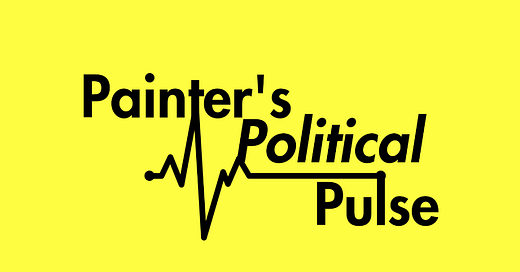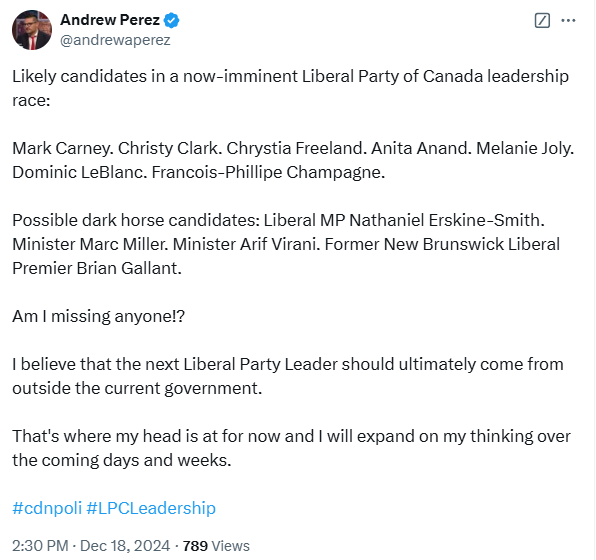Who will be the next leader of the Liberal Party of Canada
A totally unscientific odds on favourite list of potential Liberal Party of Canada candidates
My friend and fellow pundit Andrew Perez (follow him here, you really should) put up a list of the most likely Liberal Party of Canada leadership candidates for what is now the all but certain resignation of Prime Minister Justin Trudeau.
Why all the hubbub, you ask?
Well, on Monday Finance Minister Chrystia Freeland resigned from her cabinet position (she says she’s going to run again in the next election) just hours before she was scheduled to drop the annual Fall Economic Statement.
Following this was a bevy of calls from inside the Liberal Party caucus for the Prime Minister to resign (I’m not going to go over the whole sordid story, but you can read about it here, here, or here if you’re interested).
What I’m more interested in is a serious look at the potential candidates that Andrew named and looking at them in terms of odds of becoming the next Liberal Party of Canada leader.
Here is my unscientific, gut call of the odds, and how I came to these conclusions.
Please note: the organisation into Main Contenders and Dark Horse are borrowed from Andrew.
Main Contenders:
Chrystia Freeland - Odds: 2:1
Strengths:
Deputy Prime Minister and Minister of Finance, with a high-profile track record of managing crises like NAFTA renegotiation and COVID-19 economic measures.
Seen as Trudeau’s ideological and political successor, offering continuity in Liberal policies.
Bilingual and a strong communicator, with appeal to progressive voters and centrists alike.
Well-known on the international stage, boosting Canada’s diplomatic profile.
Weaknesses:
Tied closely to the Trudeau government, which could hurt her if there’s significant demand for a fresh start.
Some question whether she has the charisma to lead a major election campaign.
Mark Carney - Odds: 3:1
Strengths:
Former Governor of the Bank of Canada and the Bank of England, bringing unmatched economic credentials.
Appeals to fiscal moderates and business-minded voters who are key in swing ridings.
Strong international reputation could position the Liberals as a party of competence on the global stage.
Seen as a "clean break" from traditional political figures, offering an outsider perspective.
Weaknesses:
Never held elected office, raising questions about his ability to connect with voters and navigate parliamentary politics.
May struggle to rally grassroots Liberal members who prioritize loyalty and experience in elected roles.
Would be vulnerable to the same “Just Visiting “ critiques that killed Michael Ignatieff’s chances.
Anita Anand - Odds: 5:1
Strengths:
Highly competent and effective Minister of Defence, lauded for her leadership in vaccine procurement during the pandemic.
Represents diversity as a South Asian woman and could appeal to multicultural urban voters.
Steady, no-nonsense approach appeals to those looking for pragmatic, competent leadership.
Weaknesses:
Lacks broad national recognition or deep roots within the Liberal Party’s grassroots.
Not known for having a dynamic or charismatic public presence, which could hinder her in a campaign setting.
François-Philippe Champagne - Odds: 6:1
Strengths:
Charismatic and relatable, with a compelling personal story that resonates with everyday Canadians.
Bilingual and deeply connected to Quebec, which is vital for Liberal electoral success.
Strong record as Minister of Innovation, Science, and Industry, and as Foreign Affairs Minister.
Weaknesses:
While popular in Quebec, his national appeal might be limited compared to other front-runners.
Needs a clearer vision to differentiate himself from other candidates.
Mélanie Joly - Odds: 10:1
Strengths:
Current Minister of Foreign Affairs, giving her significant international experience and national visibility.
Strong appeal in Quebec, a crucial Liberal stronghold, and fully bilingual.
Skilled in retail politics and has worked to rebuild her credibility after early career stumbles.
Weaknesses:
Previous controversies in smaller portfolios, including her handling of Canadian Heritage, could be used against her.
Seen by some as lacking the gravitas needed to lead on complex policy issues.
Her position on Israel - Hamas War has severely tarnished her reputation among more fiscal-leaning moderate Liberals.
Dominic LeBlanc - Odds: 15:1
Strengths:
One of the longest-serving Liberal MPs, with deep roots in the party and strong relationships with key stakeholders.
Trusted ally of Trudeau and widely respected within the caucus.
Represents stability and continuity for the party.
Weaknesses:
Health challenges may raise concerns about his ability to withstand the physical demands of a leadership race and election campaign.
Limited public charisma and low name recognition nationally.
Christy Clark - Odds: 20:1
Strengths:
Former Premier of British Columbia with a record of winning elections in a major battleground province.
Skilled communicator and experienced campaigner, capable of energizing a campaign.
Centrist appeal could help unite moderate Liberals and Conservative swing voters.
Weaknesses:
Tied to BC's Liberal Party, which in its time was ideologically distinct from the federal party and more conservative (NOTE - The party became the BC United Party and had to stand down in the last election as a result of financial and organisational issues. Unknown what kind of factor this might have on her leadership campaign).
Her time as Premier was polarizing, particularly on issues like pipelines and Indigenous rights.
Long out of federal politics, limiting her national network.
Dark Horse Candidates:
Nathaniel Erskine-Smith - Odds: 100:1
Strengths:
Represents a younger, progressive voice within the party, appealing to Millennials and Gen Z.
Known for his principled stances and willingness to break with party lines, showing independence.
Strong advocate for social justice and environmental issues, aligning with progressive Liberal voters.
Weaknesses:
Limited Cabinet or executive experience.
May struggle to rally establishment party support due to his outsider image.
Marc Miller - Odds: 250:1
Strengths:
Known for his deep commitment to Indigenous reconciliation, a priority for many Liberal voters.
Close ally of Trudeau, ensuring continuity for loyalist supporters.
Fully bilingual and appeals to Quebec voters.
Weaknesses:
Low public profile and limited experience in leadership roles.
May not have the charisma needed to energize a national campaign.
Arif Virani - Odds: 500:1
Strengths:
Represents the party’s multicultural and urban voter base.
Strong legal background and reputation as a thoughtful and principled MP.
Weaknesses:
Lacks name recognition and political experience at the national level.
Limited network within the party’s power structure.
Brian Gallant - Odds: 1000:1
Strengths:
Former Premier of New Brunswick with executive experience.
Appeals to Atlantic Canada, an important Liberal base.
Youthful and articulate, with a centrist appeal.
Weaknesses:
Seen as too regionally focused and disconnected from federal politics.
Out of office for several years, limiting his relevance on the national stage.
There we have it, my totally unscientific odds on favourites to win the next Liberal Party of Canada leadership race.
What do you think?





